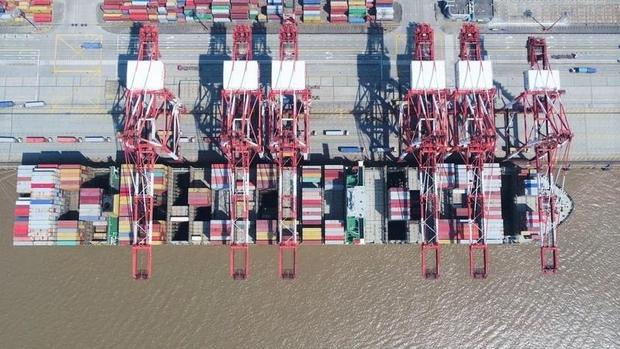 Aerial photo taken on March 18, 2020 shows a container dock of Yangshan Port of Shanghai, East China. (PHOTO / XINHUA)
Aerial photo taken on March 18, 2020 shows a container dock of Yangshan Port of Shanghai, East China. (PHOTO / XINHUA)
Foreign direct investment in China in 2020 is expected to exceed last year's total, as the economy has recovered quickly from the COVID-19 pandemic and the efforts to stabilize investment and foreign trade continue to yield results, officials and experts said on Tuesday.
They said China's continuously improving business environment has provided global companies a fair and open market, an efficient supply chain, competitive talent pool and 5G infrastructure for innovation, as well as confidence in its economy. Multinational corporations are keen to add investment in China and build up their industrial and service chains, in particular in areas of operations, research and development.
China's actual use of foreign capital rose by 5.5 percent on a yearly basis to 98.7 billion yuan (US$14.38 billion) in November, marking the eighth consecutive month of positive growth in foreign direct investment, according to data released by the Ministry of Commerce on Tuesday.
FDI in China grew by 6.3 percent year-on-year to 899.38 billion yuan between January and November. In dollar terms it increased by 4.1 percent to US$129.47 billion.
While many global economies are still trying new measures to tackle the spread of the pandemic, create jobs and boost exports, China is one of a few places that have kept global companies afloat, said Ma Yu, a senior researcher at the Beijing-based Chinese Academy of International Trade and Economic Cooperation.
Unlike many economies, China has faced manageable supply chain risks as it is increasingly less reliant on manufacturing FDI over the past several months, said Zhang Shenfeng, vice-chairman of the China Council for the Promotion of International Trade.
While many global economies are still trying new measures to tackle the spread of the pandemic, create jobs and boost exports, China is one of a few places that have kept global companies afloat, said Ma Yu, a senior researcher at the Beijing-based Chinese Academy of International Trade and Economic Cooperation
ALSO READ: China's FDI inflow rises for 7th month
He said the situation has proved that the country's attractiveness to foreign investment has not changed, its comprehensive competitive advantages in industrial facilities, human resources, and infrastructure have not changed, and foreign investors' long-term investment and business expectations in China have not changed.
Pushed by factors including computing, industrial solutions and retail businesses, and increasing exports of emerging services such as telecommunications and insurance, China's services trade will continue its strong run as the country deploys more resources to stimulating domestic consumption, infrastructure development and high-value-added manufacturing said Zhao Ying, a researcher at the Beijing-based Institute of Industrial Economics, which is a part of the Chinese Academy of Social Sciences.
The country's services sector attracted FDI worth 704.46 billion yuan during the 11-month period, up 16.1 percent on a yearly basis, accounting for 78.3 percent of the country's total use of foreign capital.
In addition to hastening talks on the Comprehensive Agreement on Investment with the European Union, China and Belarus also launched negotiations on an agreement in trade and investment in services on Monday, according to information provided by the Ministry of Commerce.
READ MORE: China's FDI inflow up for 8th straight month
Because the pandemic has changed the ways of doing business for many companies in both China and abroad, the Beijing-based CCPIT has launched a new digital platform-"Investing in China"-on Tuesday to better introduce commercial projects across China, as well as policy environment, industry characteristics, competitive advantages, investment requirements and project information. The platform uses Chinese and English interfaces to provide services to companies.
Matthew Margulies, vice-president of China operations of the US-China Business Council, said companies from the United States are optimistic about their growth in China over the next five years.
Considering that China has successfully controlled the pandemic and many economies have reported slow growth in other parts of the world, more global companies will look for growth opportunities in China, he said.
Ali Obaid Al Dhaheri, the United Arab Emirates' ambassador to China, said the current Chinese market has strong growth potential and can be considered as a safe investment destination for foreign companies.
From this perspective, it will occupy a large part of the investor's portfolio. Those who seize the opportunity to lead the competition now will likely realize huge profits, he said.


